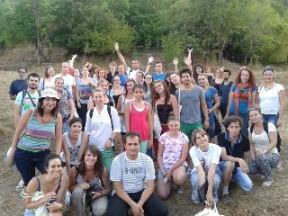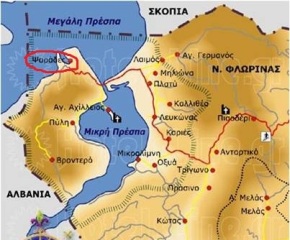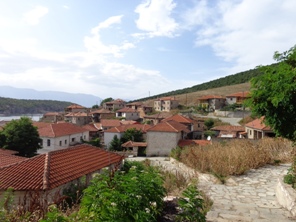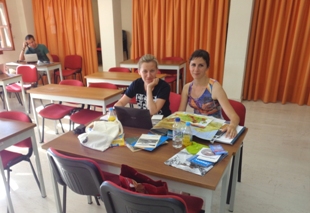9th International Konitsa summer school in anthropology, ethnography, and comparative folklore of the Balkans
How we ‘did the field’ in Greece in four days
Konitsa, 23 July – 8 August 2014


A quite intense school programme allowed us to get to know both classical academic traditions of teaching anthropology (‘Oxbridge’) and relatively new centres of anthropological and ethnographical research in the Balkans and in Greece. The first educational module lasted three days and included such subjects as:
- The politics, poetics, and pragmatics of Serbian ethnology and anthropology (by Slobodan Naumovic, University of Belgrade, Serbia).
- Border crossing: islands, continents, nomads within, and barriers of gender, class and race (by Judith Okely, Oxford, UK).
- Doing fieldwork: theory, method, and the production of anthropological knowledge (by Vassiliki Kravva, Panayotis Panopoulos, Vassilis Dalkavoukis, Ioannis Manos, Konitsa, Greece).
 To be especially useful for our fieldwork there we found the course by professor Judith Okely who is known not only for her study of Gypsies but also for her standing at the origins of women’s movement in English academia at Oxford. In her course she brilliantly demonstrated through her own personal and professional life how symbolic boundaries between gender, class and race can be created, cross, be destroyed and recreated.
To be especially useful for our fieldwork there we found the course by professor Judith Okely who is known not only for her study of Gypsies but also for her standing at the origins of women’s movement in English academia at Oxford. In her course she brilliantly demonstrated through her own personal and professional life how symbolic boundaries between gender, class and race can be created, cross, be destroyed and recreated.
The fieldwork exercise was, perhaps, the most exciting among all other educational modules as it offered a ‘hands-on’ field experience. Undoubtedly, it was impossible to do something ‘serious’ and produce academically rigorous results in just four days of fieldwork, but that was the challenge for us to face. According to the tradition formed throughout the nine years of the school’s history, organizers offered us three options of fieldwork: within Greece, at the Albanian-Greek or at the Greek-Albanian borders. We opted for something else… a small fishing village called Psarades and situated on the bank of Prespa lake in the region where borders of three states meet - those of Greece, Albania, and FYROM – borders political or state ones but what interested us most was to look into symbolic boundaries lying between the people living in the region.
 Our trip across Greece was no easy ride as public transport between small cities and even regional centres is not as much developed in the country as one would expect but we were guided by our curiosity and considered any difficulties as an adventure of a kind. Actually, the phrase ‘Follow your curiosity’, given to us by Judith Okely for guidance, inspired us throughout the trip (and here boundaries along the lines field-travel-adventure were rather blurred as well).
Our trip across Greece was no easy ride as public transport between small cities and even regional centres is not as much developed in the country as one would expect but we were guided by our curiosity and considered any difficulties as an adventure of a kind. Actually, the phrase ‘Follow your curiosity’, given to us by Judith Okely for guidance, inspired us throughout the trip (and here boundaries along the lines field-travel-adventure were rather blurred as well).

The first outcome we got was the refutation of our hypothesis – as a matter of fact, in the region the fate and fortunes of Greeks , Albanians and Macedonians have long been closely intertwined and Psarades village is by far not a ‘Greek island’ there. Moreover, the boundaries of the everyday life are kaleidoscopic and vary a lot across the region: even during the four days of our stay there we could detect (in terms of ‘locality’) the following pairs of ‘we-they’ opposites:
- Locals (hereinafter – residents of the Prespa region) – non-locals (Greeks).
- Locals – Greeks-residents of other countries (USA, Australia, Canada, Luxemburg, Germany, Italy).
- Locals – foreigners (usually, tourists) (France, Belgium, Great Britain).
- Greek-speaking population that masters Dopia (Ντόπια) – a local dialect of Macedonian origin – Greek-speaking population that does not know Dopia.
- Greeks – Albanians from Albania (the example of so called trans-border mobility) – when Albanian nationals cross the border in order to find a temporary job in Greece, and then return home to Albania).
- Greeks – locals of Albanian descent brought up in Prespa.
- Albanians from Albania - locals of Albanian descent brought up in Prespa.
- Periphery – Centre (in terms of distribution of power and resources).
These are just a few categories that we managed to observe in the course of our four-day intense fieldwork exercise.

The region of Prespa seemed to us to be very promising in terms of research. During our stay there we could establish good working and personal relationships which may be a good basis for further fieldwork research.
Upon our return to the ‘base’ in Konitsa we continued our training. The second educational part of the school proved to be no less interesting:
Environmental history and cultural ecology of the Mediterranean and the Balkans (by Oliver Rackham, Cambridge, UK; Vassilis Nitsiakos, Kalliopi Stara, University of Ioannina, Greece).
Christian Orthodoxy in the Balkans: from the Ottoman domination to the collapse of Communism (15th to 20th centuries) (Daniella Kalkandjieva, University of ‘St. Kliment Ohridski’, Sofia, Bulgaria).
The past in the present: music and sounds in the Balkans (Rajko Mursic, University of Ljubljana, Slovenia).
During the last day the participants presented their fieldwork projects. So did we (to see the presentation, please go to http://lsar.tsu.ru/public/images/education/summer%20school%20Greece/Psarades%20case.pdf).

Irina Poprvako, LSAR leading research fellow
Elena Karageorgii, LSAR junior research fellow





 The project "Man in a Changing World. Identity and Social Adaptation: Past and Present" is funded by the Russian Government
The project "Man in a Changing World. Identity and Social Adaptation: Past and Present" is funded by the Russian Government 